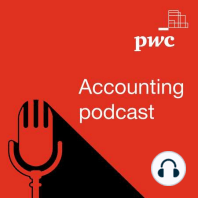31 min listen

Forecast 2021: The rise in central bank digital currencies
Forecast 2021: The rise in central bank digital currencies
ratings:
Length:
40 minutes
Released:
Jun 24, 2021
Format:
Podcast episode
Description
In our Forecast 2021 podcast series, we’re focused on offering insights to help you better understand and manage some of the opportunities and challenges that your company might face—think policy, technology, and other big picture topics. In this week’s episode, we focus on central bank digital currencies, and what CFOs should know. From PwC’s Intelligence group, Craig Stronberg, Nataly Yackanich, and Zain Siddiqui join host Heather Horn to provide their insights on this hot topic.Topics include:1:23 - Background. We start with a discussion of the basic terminology—central bank digital currencies (CBDC), cryptocurrencies, and stable coins—and then touch upon how cryptocurrencies work on a blockchain and different types of “wallets.”8:54 - Greater use of CBDCs. Nataly explains how central banks are researching the use of CBDCs to modernize the current payment systems and enhance financial inclusion. 14:17 - Control of central banks. Some CBDCs create central bank liability, essentially creating a digitized version of a currency. Zain explains.19:17 - China on digital currencies. Craig and Zain explain China’s role in creating a central bank digital currency and why CFOs should watch this closely for strategic purposes.26:19 - CFO focus. Nataly explains how the treasury function is undergoing a transformation to be increasingly digital and efficient, and how digital assets have the ability to transform business-to-business (B2B) payments infrastructure. This is an exciting change for CFOs.32:05 - Key takeaways. Our guests summarize key points from a geopolitical perspective and where they see this conversation on digital currencies headed in the near term.Want to learn more? Craig references this testimony as a great way to get up to speed.For additional information, listen to our Podcast: Cryptocurrency? Digital Asset? What’s the accounting? and read our Regulatory brief - The evolution of money: Why financial institutions should start paying attention to CBDCs.Craig Stronberg leads the Macro Capability for PwC Intelligence, spearheading the team of analysts that provide macroeconomic and geopolitical intelligence to key stakeholders. Named as one of the "100 Most Creative People in Business” by Fast Company, Craig had a nearly 20-year career in national security affairs working for and advising numerous agencies and international partners, having been decorated five times.Nataly Yackanich is the lead financial services analyst for PwC Intelligence. She advises stakeholders on the business implications of emerging issues in the financial services industry. She is a CFA charterholder with buy and sell side equity experience covering multiple industries, including financial services, industrials, and technology.Zain Siddiqui, is a senior economist for PwC Intelligence with a specialty in macroeconomics and finance. He advises stakeholders and clients on the business implications of emerging macro and geopolitical vulnerabilities, and helps them shape business strategy.Transcripts available upon request for individuals who may need a disability-related accommodation. Please send requests to us_podcast@pwc.com.
Released:
Jun 24, 2021
Format:
Podcast episode
Titles in the series (100)
Human capital disclosure trends in recent 10-K filings by PwC's accounting podcast